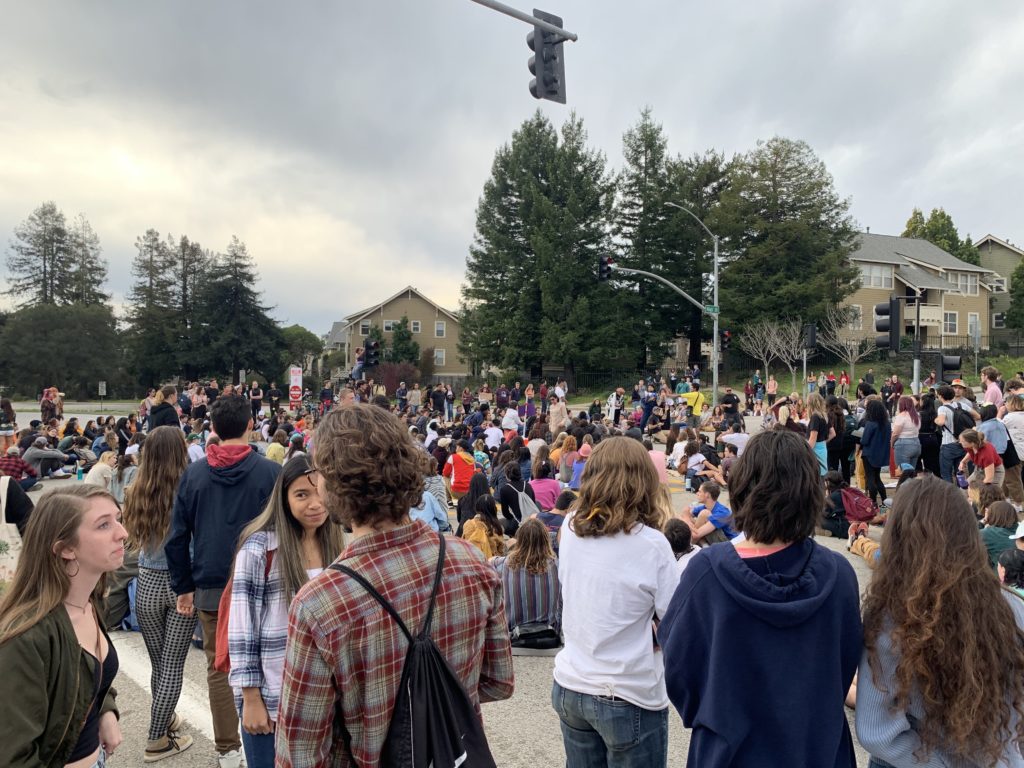
University of Santa Cruz students continue their strike for a movement that began by graduate students for a cost of living adjustment (COLA). On Friday, the school administration’s threats became reality as graduate student workers were fired from their jobs.
Strike actions have been ongoing since Nov. 2019, including withholding fall quarter grades, taking over dining halls to allow students to eat without cost, and more recently refusal to hold classes, daily picketing and the blocking off of campus entrances.
At 12:30 p.m. this past Friday, Feb. 28, an email from Executive Vice Chancellor Lori Kletzer informed the UCSC community that 54 graduate TAs who have withheld grade information for the fall quarter “will be dismissed from their spring quarter appointments.”
According to the website payusmoreucsc.com, the demands presented to UCSC administration are “a Cost of Living Adjustment for every graduate student, regardless of residence, visa, documentation, employment or funding status to bring us:
1. Out of rent burden
2. Without raising tuition or campus fees
3. With a guarantee of non-retaliation
At current rates, this amounts to an additional monthly payment of $1,412.”
Lachlan Summers is a third-year PhD student in anthropology at UCSC. Via email, he said, “We’re at a university where most graduate students make $2000 per month, for nine months of the year, seeing us pay at least 50% of our income in rent. I personally pay 64% of my yearly income in rent. Administration employees, especially the bigwigs like Lori Kletzer and Cynthia Larive, are paid $300,000 and $400,000 a year.
“Students, both grads and undergrads, and service workers are regularly forced into homelessness, they sleep in their cars, they commute for over two hours from other areas,” Summers continued. “We, as the people who make this university function, think we should be paid enough to live here. We’re fighting against the idea that higher education and research should only be available for the people wealthy enough and U.S.-American enough—white enough—to access it.”
The United Automobile Workers local 2865 union represents student workers across all schools in the University of California system. UC graduate students are all paid the same rate despite the differences in cost of living in the schools’ different locations. The union has not authorized the action taken by UCSC students, making it what is known as a “wildcat strike.”
UCSC administration has stated the wildcat status as a reason for their unwillingness to negotiate with the strikers, with UCSC President Janet Napolitano writing in a Feb. 14 open letter that it would “undercut the very foundation of an agreement negotiated in good faith by the UAW and ratified by thousands of members across the system.”
Students from many of the other UCs have publicly stated their solidarity for the UCSC strikers. According to the updates on the Pay Us More UCSC website, on Thursday, Feb. 27, UC Davis graduate students began their own grading strike and those at UC Santa Barbara enacted a full teaching strike.
“This is affecting everything,” student Trevor Davies said. Like many of his fellow undergraduates, he fully supports the strikes and withholding of grades. “It’s a way to make them listen, it’s a way to make them pay attention, and it’s a way to disrupt things,” he said. “Protest without disruption is just talking into the void.”

One of the strikers present at the picket line on Monday morning (Feb. 24) was Natalya Jackson, a sixth-year graduate student in the UCSC math department. This was the tenth day of picketing, and she had been present for every single one. In the earlier days, she witnessed as police officers charged into the crowd of protesters with such force that the Santa Cruz City Council would decry it as unnecessarily violent. This forced Jackson to have a difficult conversation about police brutality with her young daughter, who was also present. Jackson said that the school had spent up to $300,000 per day on police presence—money that could have been going towards a COLA.
Jackson explained that some students were unable to get treated for the injuries they sustained from police because of the policy of banning students from the campus for two weeks if they are arrested, meaning that they were unable to access the health center.
Jackson was set to graduate at the end of this school year, but now her future is uncertain. This is because of her receiving a Student Conduct Violation because of her actions related to the strike, specifically the withholding of grades—a tactic UCSC graduate student teachers are using to leverage with the administration. She argued that she shouldn’t be punished under the student code, as the actions she took were those of an employee of the school rather than a student.
Multiple conduct violations can result in expulsion. Jackson is at higher risk for losing her place at UCSC as both a student and worker because she has previous violations. According to what she has seen, not all graduate student workers who have taken action have received conduct violations. She said that she believes UCSC is targeting “vulnerable populations” specifically—like those with previous violations and international and undocumented students who need their jobs and/or enrollment to keep their visas—with violations in order to use them to gather information.
As a striking international student, this directly and seriously affects Summers. He expects and is planning for his deportation on April 21—despite the fact that, as he explains, “I’m three years into this research, I have presented at conferences and I have publications in the pipeline, and I have taught nearly 200 undergraduate students here. UCSC has been explicit that, despite this, they think I have no place in this country anymore.”
Speaking about the administration, Summers said “I’m stunned by their callousness,” noting that students who are pregnant, single parents, international, undocumented, or have chronic illnesses are especially at risk. “Numerous bright researchers who have educated hundreds of students [are] just being cast out of the university because they want to be paid enough to live,” he said.
As Jackson sees it, graduate students are part-time workers with part-time pay but are expected to do the labor off a full-time job. This means that some are unable to take on a second job despite their need for additional income. Also, there are some who are contractually unable to work second jobs, such as international students or those given childcare reimbursements.
“I have several degrees in math, but I don’t need those to see that doesn’t add up,” Jackson said.
Jackson has experienced firsthand the difficulty of living on the current pay for graduate students and of finding affordable housing in Santa Cruz. When she and her family were removed from campus housing because of complications with her bipolar son, she was homeless for a period of time.
Jackson believes that it is the graduate students who give UCSC classes the value they have today, as she sees that it is them, even more than the professors, who continually work to improve their pedagogy and who are able to reach a diverse community.
“It’s hard to see past this picket line,” Jackson said. “[Right now,] nothing is real beyond it.” She feels that she is torn between her desire to not cross the picket line and the need to continue work on her PhD dissertation.
Summers emphasized that grad students have not been alone in their efforts. “It’s important to note that the graduate student strike wouldn’t have happened without the support of the numerous other movements. The most notable of which is COLA4ALL, which is fighting for a cost of living adjustment for everyone at UCSC, not just grad students, and the People’s Coalition, which is a group of marginalized and hyper-marginalized undergraduate students who demand, among other things, the complete decolonization of the university.
“There are other groups, but these two, in particular, are fantastic, inspiring organizers, who have added truly immense energy to the graduate student actions, and are reimagining the university in profound ways,” he said.
Mills students can assist the strike movement by helping to get information and support out by sharing on social media. They can follow and reshare from @cola4all and @payusmoreucsc on Instagram and Twitter. They can also donate to the “Support Fund for Striking Workers at UCSC!” GoFundMe, which states that “all donated funds are distributed to the collective for food, action supplies, potential legal fees, and docked pay.” As of Feb. 28, the GoFundMe has raised over $153,000.
Davies suggested that Mills students come to the physical strikes and picketing to up the number of bodies there in support. Summers added that Mills students can “write to [our] lecturers and professors asking them to refuse to participate in lectures, research clusters, and intellectual networks with UCSC.”
“Agitate within your own school and social networks for higher education as a public good, a critical mode of enabling social mobility, and a means of recreating the nation,” Summers said.
The toll that the strike has taken on graduate students is visible. Jackson mentioned that she has developed stress hives. Summers has added “PhD Student awaiting firing and deportation” to his email signature.
Yet Jackson emphasized that she was out there not just for herself, not just for other graduate students, but for the greater cause of UC system reform.
“This isn’t about me,” Jackson said. “It’s about being part of the movement… Maybe this is the legacy I leave.”
“We demand to be valued,” she said.
CORRECTIONS: Up to $300,000 per day has been spent on police presence, not $30,000.
